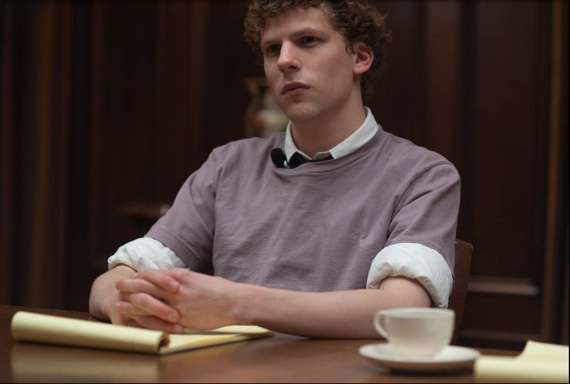The Social Network
2:2
Director: David Fincher
Cast: Jesse Eisenberg, Andrew Garfield, Justin Timberlake, Arne Hammer & Joseph Mazzello
I feel I should start by saying I don’t have a facebook. It’s something that never appealed to me. But strangely The Social Network (or “The Facebook Movie” as it will no doubt be monikered) was something I was looking forward to. Granted, like everyone else, the idea of a film based aroundthe making of a website sounded initially uninviting. It would no doubt attract some cocksure borderline adolescent director/cast/writers and emerge an overhyped mess. But then something surprising happened: Aaron Sorkin, agreed to bring his loquaciously dry wit to scriptwriting duties while David Fincher (Fight Club, Zodiac) surprised everyone by signing on to direct. Suddenly The Social Network became exceptionally legitimate and the early low expectations were suddenly replaced by feverous web excitement (fueled superbly by the curiously alluring marketing). But have Fincher and Sorkin managed to deliver on the hype? Barely.
The first thing you should know about The Social Network is that it is a. A story based on true events that shouldn’t be taken as gospel. The Mark Zuckerburg of The Social Network (Jesse Eisenberg) is a borderline autistic and conniving sociopath, someone whose sole ambition is not money or fame but power. The film purports that Zuckerberg, scorned by Harvard’s elitist clubs and uninterested girls, turned to creating his own social experience out of spite and jealously. To do this he enlisted his best friend Edwardo Saverin for some financial backing and the pair set about “taking the entire social experience of college and putting it online”.
Of course complications soon arise in the sculpted form of the Winklevoss twins (both played by Arnie Hammer, a body double and some digital trickery) who believe that as they pitched a website idea to Zuckerberg that involved something similar to The Facebook (as its first labeled), they are entitled to compensation. Thus the film is told in flashback from the boardrooms of two separate legal actions- one resulting from Saverin being muscled out in favor of slick Napster founder Sean Parker (Justin Timberlake) and the other involving the Winklevoss brothers. So as the film unfolds we see the astonishing but sordid rise of Facebook as it goes from college social site to global powerhouse in a matter of years, all while naysayers scream foul.
But there really isn’t much more than that. Despite the scale of what the film depicts- it seems entirely set within 3 interchangeable scenes- boardrooms, college dorms and Californian offices. To make things worse the plot mostly revolves around people typing lines of code into computers- that doesn’t make for very exciting cinema. Which is a pity, especially considering the lengths the cast and filmmakers have gone to crafting a compelling film.
In the lead role Eisenberg throws off the “Michael Cera-lite” image and brings an eerie precision to Zuckerberg. His unblinking, staccato performance bounces between hilarity and disturbing in equal measure, but by the end becomes a bit graining. Elsewhere Arnie Hammer impresses in the dual role of the spoilt Olympian Winklevoss twins, as does Andrew Garfield as the belittled and enraged Saverin. The biggest surprise however is Justin Timberlake’s turn as the malevolent, paranoid and slightly nerdy slickster Sean Parker. Presumably the irony of a multi-platinum pop star portraying the man who started illegal music file-sharing was not lost on the filmmakers, but Timberlake manages to ensure his contribution to the film goes beyond mere stunt casting. But again while the cast is good, they’re not excellent. The same can be said for the script. In typical Sorkin form its laced with Wilde-esque quips and highly structured monologues but lacks any truly exciting scenes. Elsewhere the score by Trent Reznor (of the Nine Inch Nails-another surprising choice) and Atticus Ross brings some energy to some of the more dour scenes but fails to be really memorable. Finally Fincher’s direction is typically beautiful– his use of light once again making the most pedestrian of locations seem gorgeously ominous- but stunning cinematography doesn’t mean the film isn’t often boring.
I think the film’s main flaw is the lack of likeable characters. Zuckerberg is appallingly antisocial. The Winklevoss twins are spoilt brats whose compensation demands are completely undeserved. Parker is probably the closest “villain character” in the film and Saverin would elicit more sympathy were he not so inept. Therefore the entire film basically consists of observing privileged upper class white boys arguing over who gets 60 million and who gets 600 million. By the time it reaches its hackneyed and labored conclusion- I found that I really didn’t care who founded Facebook. Much like how I don’t care about having a Facebook page.






